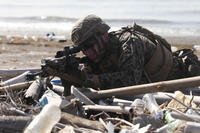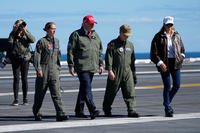The U.S. military's top official told troops Wednesday that the recent anti-American comments by the Philippine president will have no effect on the United States' growing presence in the Pacific region.
Defense Secretary Ashton Carter spoke to a room full of troops that included U.S. Army, Marine and Air Force personnel at Fort Leonard Wood, Missouri.
One Marine staff sergeant asked Carter how the recent comments by Philippine president Rodrigo Duterte about "breaking ties with the U.S. and aligning itself with Russia and China" will affect the U.S. presence in the Pacific.
"The Philippines is a long-standing ally of the United States. We continue to regard them as an ally and, obviously, we are having conversations with the government of the Philippines about the future of that," Carter said.
"That has been good for the Philippines; it's good for the United States. Our strategy, however, is strong and isn't dependent on any single one of our friends or our allies there. We have many, and there is a huge demand for us to do more."
Carter's comments come amid increasing uncertainty about Washington's treaty alliance with Manila. Duterte, who took office June 30, has displayed antagonism toward America, declaring his desire to scale back military engagements with the U.S. and telling President Barack Obama to "go to hell."
Duterte has also begun rekindling once-frosty relationships with China and Russia, The Associated Press reported recently. Duterte said Wednesday that he'll consider continuing to acquire weapons and defense equipment from the United States if his military recommends he do so, despite offers from China and Russia, according to AP.
Carter maintains that the U.S. has many allies in the Pacific because "many of them have concerns about Chinese behavior or also concerns about one another that go way back in history. It has been the case for both of those concerns for decades."
The American military presence has been the "flywheel in that part of the world," he said.
"In a region that has no NATO, no formal structure for security -- where the wounds of the past have not healed the way you see at least in Western Europe, the American military presence has had a stabilizing effect," Carter said.
Most Pacific nations want the U.S. presence to continue, he said.
"We intend to continue to do that because it is very much in the United States' interest to do that," Carter said. "This is the part of the world that is going to have half the economy of the world, half the world's population, and it is the single part of the world of greatest consequence to America's future."
It is important that the United States have a strong position in the Pacific and that it be peaceful, Carter said.
"And one of the ways we do that is by having the awesome power of our military there, but the other way is by having friends and allies there, and we have lots of them.
"I'll remind you of our other formal allies there -- Japan, South Korea, Thailand, Australia. Plus, we have lots of partners that we work with and they are asking us to do more -- India; Vietnam; Singapore, a longstanding friend. So there is a tremendous appetite for American presence and American persistence there, and we are going to meet that appetite because it's not just good for the countries out there and good for the region, it's good for us and good for the United States."
-- Matthew Cox can be reached at matthew.cox@military.com.






























